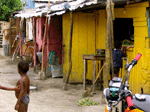Dominican Republic: Poverty and inequity persist in spite of the promises
Published on Fri, 2012-12-07 12:55
To put an end to poverty, the authorities in the Dominican Republic must promote the equitable distribution of wealth, broaden and improve the quality of education, health services, employment and social security, and implement policies to help the poorest and most vulnerable people. But, according to civil society organizations in their contribution to the Social Watch Report 2013, the official rhetoric about social investment and human development is contradicting by an economic policy of cutting expenditures and increasing taxes, in accordance with conditions imposed by the International Monetary Fund. The Dominican Republic has enjoyed steady economic growth in the last 20 years, but 35% of the Dominicans are living in poverty and 9% in extreme poverty. These are almost the same proportions as in 2000. According to the national Social Watch report, the gross domestic product has grown but wealth is not distributed in an equitable way, and lack of protection and inequality are feeding violence and crime in a vicious circle that makes it even more difficult to achieve social goals. The local implementation of the Millennium Development Goals has not taken into account the spread of the informal economy, the big number of micro, small and medium enterprises, and inequalities in access to and the quality of education, health and employment, all of which is detrimental of women, young people and rural communities. In 2011 the Government admitted that it would be very difficult to reach the MDGs by 2015, and suggested that these would only be attained by 2020. The excuses in the official forecast point to the 2003-2004 bank crisis, and greater cutbacks in public spending are said to be needed to cope with the consequences of the crisis. According to the country’s Social Watch coalition, to fulfil its poverty reduction goals, the Dominican Republic must take measures to distribute its growing wealth in an equitable way by implementing policies to improve the quality of education, to create decent jobs and to execute social programmes aimed at the poor and the most vulnerable sectors. In 2011 the authorities formulated a National Strategic Development Plan for the next 20 years. According to the authors, this constitutes a good tool to work towards long term progress. But it is essential to consolidate this programme by widening access to basic services, improving the quality of education and health services, promoting people’s registration in the social security system, pursuing equitable social integration and attaining the MDGs. According to the Social Watch report, there is inequality in all spheres. Young people and women lack opportunities and this severely limits their possibilities for human development. Around 20% of the people in the country do not have identity documents, and 12.7% of these are in the 10 to 24 age bracket. To make matters worse, schooling rates are low and the education is of poor quality. Around 36% of pupils do not complete the basic education cycle. Most of these children are from the poorest sectors and they have to drop out in order to work to bring money into the home, to care for other family members or to do unpaid household work. The situation of women is worrying. In 2010, the employment rate among the male workforce was 61% but that of women was only 33%: a gap of 27.81%. In 2011, average pay for women was only 79% of the average for men. Some 60% of university students are female but only 17% of legislative seats are held by women. In around 32% of households the head is a single mother. From 2009 to 2012 more than 429 died at the hands of their husbands/partners, and in the first 10 months of 2012 more than 100 more have been killed. |
SUSCRIBE TO OUR NEWSLETTER



